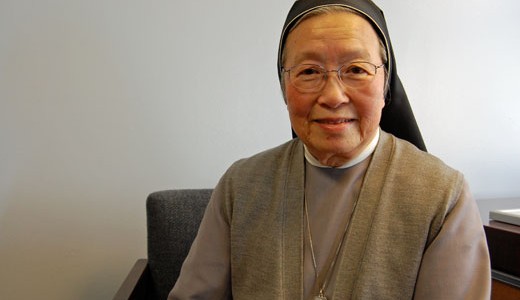Make your plan, share your plan
Sister Cecilia remembers the couple well.
The husband was relatively young — not yet 60 — and he was dying. His wife had never lost a loved one; she had no experience with death. They were on a difficult journey. And they were unprepared.
Sadly, this is not uncommon, says Sister Cecilia. As a spiritual care practitioner, the Sister has counselled thousands of patients and families over 25 years at VGH. In that time she has shed many tears, shared many laughs and, all too often, witnessed unnecessary anguish due to a lack of planning.
“Advance care plans give patients a voice when they can no longer speak for themselves,” she says, “and when they’re in place, they ease the burden for families at a very painful time in their lives.”
Role of spiritual practitioner
An advance care plan reflects your values and wishes and lets others know your health and personal care preferences in the event that you become incapable of consenting to or refusing treatment or other care.
“It’s about empowering patients to make their wishes known, and spiritual practitioners have assisted persons of all faith backgrounds with this process on an informal basis for many years now,” says Reverend Doug Longstaffe, lead of the Spiritual Care and Multifaith Services Team for Vancouver Acute.
Doug’s team of three certified interfaith spiritual care practitioners (formerly called chaplains) works closely with religious denominations to facilitate patients’ access to local clergy. The Roman Catholic Diocese of Vancouver employs Sister Cecilia, two priests, and a lay worker to meet the needs of Catholics hospitalized at VGH.
“Spiritual care practitioners frequently work at the intersection between emotions and values and this is precisely the place where patients often need assistance most when considering their advance health care plan,” says Doug. “Now that advance care planning has become more formalized, our team has become very active in looking at how we can be most effective in the process.”
Sister Cecilia, who has an in-depth religious understanding of her own denomination as well as the clinical pastoral education needed to facilitate deeper dialogue, can also correct common misunderstandings. “Roman Catholic teachings don’t allow for euthanasia or suicide and, because of that, people assume they can never disconnect life support or refuse a second round of chemotherapy,” she explains, “but that’s not the case.”
Bringing compassion and empathy to every conversation, Sister Cecilia strives to give hope and, when necessary, she helps patients and families accept the inevitable. Looking back over the past quarter-century, she says she continues to derive inspiration from patients, as well as VGH staff and physicians.
“The staff and doctors have the heart to work so very hard. I’ve learned a lot from them and their patience and tenderness to serve patients.”
How you can plan now
There’s no time like the present. Here’s how you can begin preparing your personal advance care plan today:
- Tell someone close to you: Speak with close family or friends and your health care provider(s) about your health care wishes in the event you can’t speak for yourself.
- Write it down: Use the guide and workbook “My Voice: Expressing My Wishes for Future Health Care” to help you record your beliefs, values and wishes for future health care treatment.
- Develop a contact list: Record the names and contact information of the people who qualify to be on your temporary decision-maker list.
For VCH policy and health care provider resources on advance care planning, visit VCH Connect (internal) or the www.vch.ca (public) advance care planning page.

